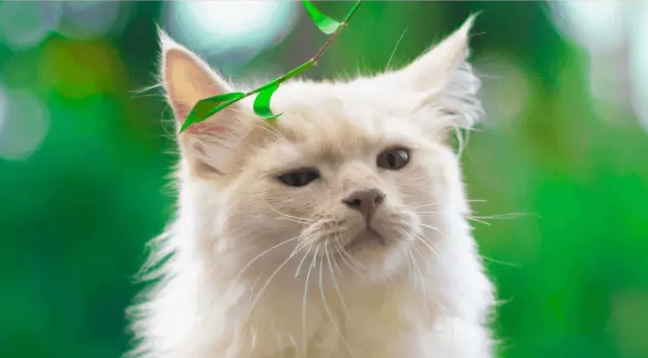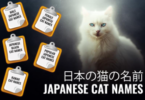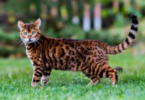Naming a pet is a delightful yet significant task, reflecting both the pet’s characteristics and the owner’s tastes. Japanese culture, with its rich history and beautiful language, offers a treasure trove of names for white cats. Whether you are inspired by nature, mythology, or modern Japanese culture, this comprehensive guide will provide you with a vast array of options to find the perfect name for your white feline companion.

Why Choose a Japanese Name?
Choosing a Japanese name for your white cat not only gives it a unique and exotic touch but also imbues the name with cultural significance. Japanese names often carry deep meanings, influenced by the country’s history, art, and nature. For white cats, names symbolizing purity, snow, and elegance are particularly popular.
Japanese Names Inspired by Nature
Japanese culture holds a profound respect for nature, which is evident in many aspects of their life, including names. For white cats, names inspired by natural elements are quite fitting.
Snow and Winter-Themed Names
- Yuki (雪) – Meaning “snow,” a perfect name for a white cat that embodies the purity and serenity of snow.
- Fuyuko (冬子) – Translating to “winter child,” ideal for a cat that reminds you of the tranquil winter season.
- Setsuna (雪菜) – Combining “snow” and “greens,” reflecting the delicate balance of nature.
- Shiro (白) – Simply meaning “white,” a straightforward yet elegant name.
- Miyuki (美雪) – Meaning “beautiful snow,” perfect for a cat with a striking white coat.
Floral and Plant-Themed Names
- Sakura (桜) – Cherry blossom, symbolizing beauty and the transient nature of life.
- Shirayuri (白百合) – White lily, representing purity and elegance.
- Kiku (菊) – Chrysanthemum, a flower that signifies longevity and rejuvenation.
- Tsubaki (椿) – Camellia, known for its pristine beauty and strength.
- Ayame (菖蒲) – Iris, symbolizing grace and strength.
Names Inspired by Japanese Culture and Mythology
Japan’s rich folklore and mythology provide a wealth of names that carry deeper meanings and stories.
Mythological Names
- Inari (稲荷) – The Shinto god of foxes, fertility, rice, and agriculture. Inari is often associated with foxes which are white in color.
- Amaterasu (天照) – The goddess of the sun, symbolizing light and purity.
- Tsukuyomi (月読) – The moon god, representing mystery and elegance.
- Susanoo (須佐之男) – The storm god, known for his bravery and strength.
- Kitsune (狐) – Meaning “fox,” often depicted as white and mystical.
Cultural Icons
- Haku (白) – From the movie Spirited Away, meaning “white.”
- Kira (綺羅) – Meaning “glitter” or “shine,” often associated with a radiant and lively personality.
- Hoshi (星) – Meaning “star,” ideal for a cat that lights up your life.
- Rin (凛) – Meaning “dignified,” perfect for a poised and elegant cat.
- Akira (明) – Meaning “bright” or “clear,” suitable for a cat with a radiant presence.
Modern Japanese Names
Modern culture and daily life in Japan also inspire beautiful names.
Trendy Names
- Sora (空) – Meaning “sky,” symbolizing vastness and freedom.
- Kai (海) – Meaning “sea,” representing depth and tranquility.
- Aoi (葵) – Meaning “blue” or “hollyhock,” a popular name with multiple meanings.
- Hana (花) – Meaning “flower,” simple yet profound.
- Ren (蓮) – Meaning “lotus,” symbolizing purity and enlightenment.
Popular Modern Names
- Koko (ココ) – A cute, trendy name for a lively cat.
- Momo (桃) – Meaning “peach,” often associated with sweetness and affection.
- Luna (ルナ) – Borrowed from Western culture but popular in Japan, symbolizing the moon.
- Nana (ナナ) – Meaning “seven,” a lucky number in Japanese culture.
- Tama (タマ) – A traditional cat name meaning “ball” or “jewel.”
Unique and Rare Japanese Names
If you want your cat’s name to stand out, consider some unique and rare Japanese names that are not commonly used.
Rare Names
- Kohaku (琥珀) – Meaning “amber,” a unique and precious name.
- Mitsuki (光月) – Combining “light” and “moon,” a rare and poetic name.
- Yuzuki (柚月) – Combining “citrus” and “moon,” a name with a refreshing feel.
- Rei (零) – Meaning “zero” or “nothingness,” representing purity and a fresh start.
- Fumiko (文子) – Meaning “child of treasured beauty,” a name with historical significance.
Names with Historical Significance
- Tomoe (巴) – After Tomoe Gozen, a famous female samurai known for her bravery.
- Yoshitsune (義経) – A legendary warrior known for his skill and honor.
- Nobunaga (信長) – After Oda Nobunaga, a powerful daimyo.
- Hideyoshi (秀吉) – Named after Toyotomi Hideyoshi, a great unifier of Japan.
- Kenshin (謙信) – After Uesugi Kenshin, a notable historical figure known for his wisdom and strategy.
Japanese White Cat Names
| Name | Meaning |
|---|---|
| Yuki (雪) | Snow |
| Fuyuko (冬子) | Winter Child |
| Setsuna (雪菜) | Snow Greens |
| Shiro (白) | White |
| Miyuki (美雪) | Beautiful Snow |
| Sakura (桜) | Cherry Blossom |
| Shirayuri (白百合) | White Lily |
| Kiku (菊) | Chrysanthemum |
| Tsubaki (椿) | Camellia |
| Ayame (菖蒲) | Iris |
| Inari (稲荷) | Fox God |
| Amaterasu (天照) | Sun Goddess |
| Tsukuyomi (月読) | Moon God |
| Susanoo (須佐之男) | Storm God |
| Kitsune (狐) | Fox |
| Haku (白) | White (Spirited Away) |
| Kira (綺羅) | Glitter/Shine |
| Hoshi (星) | Star |
| Rin (凛) | Dignified |
| Akira (明) | Bright/Clear |
| Sora (空) | Sky |
| Kai (海) | Sea |
| Aoi (葵) | Blue/Hollyhock |
| Hana (花) | Flower |
| Ren (蓮) | Lotus |
| Koko (ココ) | Trendy Cute Name |
| Momo (桃) | Peach |
| Luna (ルナ) | Moon |
| Nana (ナナ) | Seven |
| Tama (タマ) | Ball/Jewel |
| Kohaku (琥珀) | Amber |
| Mitsuki (光月) | Light Moon |
| Yuzuki (柚月) | Citrus Moon |
| Rei (零) | Zero/Nothingness |
| Fumiko (文子) | Child of Treasured Beauty |
| Tomoe (巴) | Famous Female Samurai |
| Yoshitsune (義経) | Legendary Warrior |
| Nobunaga (信長) | Powerful Daimyo |
| Hideyoshi (秀吉) | Great Unifier of Japan |
| Kenshin (謙信) | Notable Historical Figure |
Creating the Perfect Name: Tips and Tricks
When choosing the perfect name for your white cat, consider the following tips:
- Personality Match: Ensure the name reflects your cat’s personality. A playful cat might suit a name like “Momo,” while a regal cat might be better with “Rin.”
- Ease of Pronunciation: Choose a name that is easy to pronounce for everyone in your household.
- Cultural Significance: Understand the meaning and cultural significance of the name to ensure it aligns with your values.
- Trial Run: Try calling your cat by the chosen name for a few days to see if it fits.
Conclusion
Naming your white cat is an exciting journey that allows you to explore various aspects of Japanese culture. From names inspired by nature and mythology to modern and rare names, this guide provides a comprehensive list to help you find the perfect name. Remember, the best name is one that resonates with both you and your feline friend.
FAQs
1. What are some popular Japanese names for white cats?
Popular names include Yuki, Shiro, Miyuki, Sakura, and Kira.
2. Are there Japanese names that signify winter or snow for white cats?
Yes, names like Yuki, Fuyuko, and Miyuki are perfect for white cats and signify snow or winter.
3. How can I choose the best name for my cat?
Consider your cat’s personality, the name’s meaning, ease of pronunciation, and cultural significance.
4. Can I use mythological names for my white cat?
Absolutely! Names like Inari, Amaterasu, and Tsukuyomi are excellent choices.
5. What are some unique and rare Japanese names for cats?
Unique names include Kohaku, Mitsuki, Yuzuki, and Fumiko.
6. Are there any names inspired by Japanese flowers?
Yes, names like Sakura, Shirayuri, Kiku, and Ayame are inspired by Japanese flowers.
Additional Resources
For more inspiration and detailed meanings of Japanese cat names, you can refer to the following resources:






